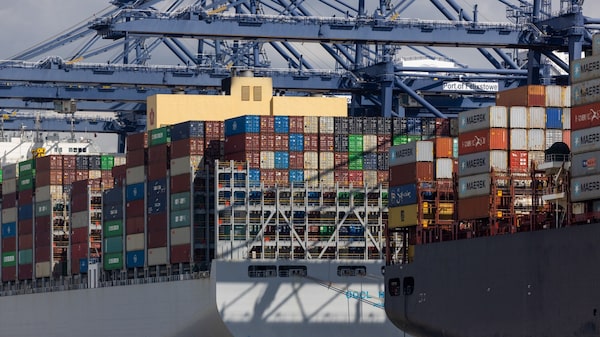Bloomberg Línea — Economic growth forecasts for Latin America in 2023 have been revised downward again in recent months by the World Bank, the International Monetary Fund (IMF) and also the Organization for Economic Cooperation and Development, with the latter saying the region is returning to the “low growth path” prior to Covid-19.
This is the starting point for the British publication The Economist, which, in an article entitled ‘Why are Latin American workers so strikingly unproductive?’* points out that for half a century the economies of Latin America have “disappointed” policy makers and experts have “invented” slogans to describe the origin of the low economic growth.
And while explaining that the region has no shortage of workers and the proportion of people of working age has more than doubled in the last 30 years, the magazine says the problem seems to be that “those workers are not very productive”.
Are Latin Americans unproductive?
“The report is very accurate for the following reason: because it clearly shows that the challenge we face in Latin America is a challenge of education. Undoubtedly, in education, elements that also relate to productivity are included: to become a much more formal society, and to be so we need to have companies that generate a lot of added value,” Juan David Aristizábal, the first Latin American to participate as co-chair of the World Economic Forum (WEF) at the 2019 annual meeting, told Bloomberg Línea.
World Bank figures cited by The Economist also reflect that annual productivity growth since 2000 in Latin America has remained between 0.2% and 0.5%, while in East Asia it exceeds 2% annually.
And Aristizábal, who is also CEO and co-founder of PROtalento, reinforced one of the weekly magazine’s messages: the need for investment in education to improve productivity, especially in areas that the world is demanding.
He stressed that one of the broader challenges in the region is to prepare people for what is needed. For example, the WEF’s Future of Work report emphasizes that the skills in demand by 2027 will be focused on energy or the green transition, meeting ESG goals, and the relocation of global supply chains.
“Many of our young people are having a background in, for example, administrative assistantships, accounting assistantships, and when you look those are positions that are disappearing. So, what is happening to our economy is that the skills that are required to be more productive and generate much more value, have very few people doing them, which generates challenges of lack of productivity that we are experiencing today,” he said.

Lack of productivity but long working hours
For The Economist, one of the main problems is the “huge informal sector” in the region, pointing out that in Brazil and Peru, half of the potential labor force is in this sector, and adding that this sector is less productive, is seen in small companies and affects the financial system, as it does not use conventional services.
But Latin America is a region of long working weeks. Upon review, and by law, weekly working hours are in the range of 40 to 48, depending on the country. Some countries however are in the process of progressively reducing the number of hours worked, such as Chile and Colombia.
However, a report by the OECD and published at the beginning of the year detailed that in its member states (in which there are some Latin American countries), the average weekly hours actually worked is 37, a figure that does not reach the limits set by the legislation of the region.
‘A snapshot of the labor market’
Despite the detailed characterization on the lack of productivity of Latin American workers, Aristizábal told Bloomberg Línea that although these reports “are a snapshot of the state of the art of the labor market and the training situation,” the publication does not affect so much the professions or trades that are in demand globally.
“Most of the remote jobs that you get on HR platforms (such as Top, Deel or others) are hiring people who have the skills that are being required globally and where there is a shortage. Those people who are hired in Latin America are people who have the skills that are highly sought-after in the global market and they are in a sector and in a very competitive labor market that I believe this type of publication does no harm to,” he added.
“What this type of publication does is to show us the challenge we have as a society in different labor markets and in the digital sector, and what it shows is that there are undoubtedly challenges of other types of productivity,” he added.
ECLAC also calls attention to low productivity
Earlier this year, the executive secretary of the Economic Commission for Latin America and the Caribbean (ECLAC), José Manuel Salazar-Xirinachs, said the cause of the low growth in the region in a second ‘lost decade’ is low productivity and a lack of productive diversification.
“This is the real development crisis facing Latin America and the Caribbean: the region has failed miserably to promote technological sophistication, economic complexity and diversification of production and exports, which has caused all countries to fall into the middle-income trap,” he said in his participation in the World Economic Forum 2023.
For Salazar-Xirinachs, productivity has not grown “at all” in 30 years in Latin America and the Caribbean, which is the region with the worst productivity performance in the last 40 years in the world.
*The original headline in The Economist article attracted criticism for the phrase “A land of useless workers”, and which the publication changed “to make clear that we are analyzing the social and economic costs of low productivity. Our aim is to draw attention to the structural causes of low average labour productivity in Latin American countries, including powerful oligopolies that mute competition and a large informal sector which forces many businesses to remain subscale. As the article makes clear, all of this is beyond the control of individual Latin Americans, whose living standards have suffered. We end with a call for better policymaking”.




